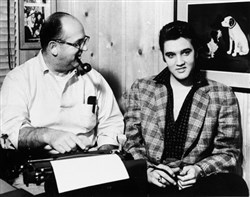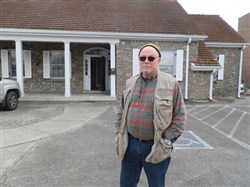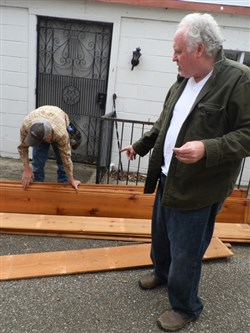VOL. 41 | NO. 6 | Friday, February 10, 2017
House that Elvis built fails to find its savior

Colonel Tom Parker and Elvis Presley in a photo shot at Parker’s Madison home in 1957. The property was later used as headquarters for the Elvis Presley Fan Club and was home away from home for Presley and his entourage during visits to Nashville.
-- Ap PhotoWhile self-styled historical archaeologists finish pulling knotty-pine paneling from the small building where Elvis’ fan club was housed, Steve North, prominent Nashville attorney, all-around good guy and former Circuit Court judge, tries to smile.
“I grew up around here,” he says while leading me up a long grade to the front of the main house, Elvis manager Colonel Tom Parker’s residence and office. It’s the worn centerpiece of the cluster of buildings where Elvis spent his Nashville nights.
They all are being gutted by music history enthusiast Brian Oxley and his band of journeyman “archaeologists.”
“I remember when I was a kid, and we’d drive by and see a pink Cadillac parked here – there is no garage – we all got excited that Elvis was in town,” the judge says.
Later he leads me into the home and to Elvis’ bedroom, now cluttered with boxes and assorted paraphernalia, some of which may have belonged to the King, most of which will go in a dumpster if it serves no archaeological purpose.
Hardly down at the end of lonely street, this 1930s-era, solid-stone home and out-buildings from which the Colonel plotted Elvis’ career – as well as his own hefty intake of the Hillbilly Cat’s money – occupy (or perhaps by publication time “occupied”) .08 acres of valuable commercial property at 1215 Gallatin Road South, just north of Spring Hill Cemetery, a Wendy’s and miles of soulless urban neon.
Judge Steve and his son Mark, who were law partners, have been trying for almost a half-decade to sell this house where Elvis slept. They moved their own law office out of here about a year ago when Steve “retired” and Mark devoted his time to non-profit The FANS Inc., raising money to support middle and high school athletics in Metro Public schools.
While he no longer has use for it, Steve’s perturbed that the Colonel’s place is being pillaged, then demolished, rather than preserved. “I really wanted to sell it to somebody who would keep it up.” A raccoon in the attic is the only inhabitant on the day I visit.
It truly is something of a landmark on the northbound side of Gallatin Road South in Madison. It could have been a history-drenched cornerstone in efforts Madison merchants have been putting into giving the old town – once the home of many music stars – a facelift.
Steve even contacted an uninterested Graceland, the Memphis home and compound where Elvis’ corpse, cars and glittery belongings draw supplicants year-round. And, he adds, there were inquiries from folks who wanted to buy the house and move it elsewhere, “but it’s solid rock from the bottom of basement to the peak of the roof and then it’s on a concrete slab, so how in the world would you lift it up to take someplace else?” Can’t do it.
Colonel Parker lived here from sometime in the ’40s to the ’70s, the judge says. But all the fan club and business operations continued from this Madison property until about five years after Aug. 16, 1977, the day Elvis’s body was found crumpled next to a toilet at Graceland. He was 42.
I have to admit here that I bought my first album, Elvis’ “Blue Hawaii,” for $2 when I was, I think 8. And because I had a school friend whose neighborhood-bar-owning dad regularly switched out the jukebox, I have most of the original 45 rpm recordings, bought them for a nickel apiece.
Although my spirit more closely aligned with John Lennon as I aged, I owe a big debt to Mr. TCB for making rock ’n’ roll music a large segment of my fabric.
Elvis recorded most of his music on Music Row (in both RCA Studio A and Studio B) and then returned to this stone compound to sleep.
“For all those years, this was where all the Elvis’ fan mail came,” says Steve. It’s also been said that sometimes – while the undeniable King of Rock ’n’ Roll slept in a tidy bedroom in the stone house – his band crashed in the fan club building out back.
If true, my dear and recently deceased pal Scotty Moore – who fashioned the mold from which rock guitarists are cast – and Bill Black and D.J. Fontana may have sought their comfort there. Of course, in later years it could have been another good guy, James Burton, and the rest of the TCB Band snoring in the fan club building.
The fan club building is book-ended by two other buildings, a small and soulless storage building they appropriately refer to as “The White House.” And then there’s the garden shed/party house, now a bit disheveled. During the Colonel’s time and throughout the 20 years the judge worked from this compound, the shed – with its fire pit, gas grill and gaslights on the patio – was busy.
Looking at it, I can imagine Elvis singing “Rock-a-Hula Baby” while the Memphis Mafia roasted a pig. “I heard the news? There’s good rockin’ tonight.” Or perhaps they grilled thick Porterhouses and toasted peanut-butter-and-banana sandwiches like so many s’mores.
After the King’s inglorious water-closet death and the Colonel’s long stint here ended, the judge and his son well-used this party pit. “We had some fun there,” says the judge, scanning the shed and the patio and smiling.
And it’s an impressive space. Hell, the whole rhythm section really could have been the Purple Gang, and there still could have been plenty of room for parties both at this outdoor structure and in the basement’s custom bar.
Still, no historic preservationists jumped in. No one did. Or perhaps the “Elvis Lives” mega machine that is Graceland would be interested. Nope.
“I really wanted to sell it to someone who was interested in preserving this home and parts of this property,” Steve adds. “I’ve had it on the market for four years.”
Without rescue, the historic property had no future.

Judge Steve North stands in front of a soon-to-vanish historic home that he had been using as law offices. Prior to that, this was the home of Elvis’ controversial manager, Colonel Tom Parker. Elvis and his entourage stayed at the compound when in Nashville for recording or simply to visit.
-- Tim Ghianni | The Ledger“They (Realtors and their kinfolk) told me that it was worth a lot more as property if the house and the buildings were demolished,” says Steve, adding he’s been told that wrecking crew assault would cost the buyer about $25,000.
Since he didn’t want it any more – he is mostly retired to his Neely’s Bend farm where sand hill cranes, blue herons, red-tail hawks, foxes, deer, coyotes, you name it, provide the entertainment when he’s relaxing outside. Horses and cattle graze on this land where he was raised.
Steve finally sold the property recently to someone who plans on putting a car wash here. That’s obviously because car washes are rare as fast-food “restaurants,” used-tire joints, taco trucks, “we finance” recycled car lots and pawn shops on Gallatin Road.
This car wash will fill the land where Elvis roamed, if everything goes through. Steve fully expects it to happen since the new prospective owners have already put money into environmental studies, zoning work, engineering and other precursors to building while awaiting final approval.
“We are looking at a relatively short time before this all is demolished,” he says. “I’ve worked 52 years as a lawyer. I’ve had my fill of law.”
His old law books are among the few personal possessions he and Mark still have in this house.
“My wife (Jo Ann) was the first woman to win election to countywide office,” he happily brags of the Nashville treasure who was councilwoman-at-large before beginning a 16-year run as Davidson County property assessor.
“She was my paralegal for a while in between those two jobs,” Jo Ann’s husband says.
Probably ought to backtrack some to the early 1990s when it was time for The North Law Office to sign a new lease for their offices in the Pilcher Building, one of many brick-and-mortar hives of lawyers that flourish in the shadow of the Historic Metro Courthouse.
“Mark and I were talking about whether we wanted to stay there,” Steve recalls. “We thought maybe we should find someplace that had plenty of free parking and easy access to the interstates for our clients.
“We were driving home together one day, talking about that, when we drove right past this place.
“Mark says ‘How about the Colonel’s property?’”
The Colonel was still alive at the time, but he no longer was affiliated with anything Elvis-related – all rights belonged to the singer’s heirs – and he lived in Vegas, where he died in 1997 after suffering a stroke at his home.
Steve thought long and hard before making a move from the Courthouse area out here to Madison.
“I always thought that if you are going to be a trial lawyer, you had to be near the Courthouse.”

Brian Oxley describes how each piece of knotty-pine wall paneling is being numbered so it can be put back together in his hoped-for museum. The guy doing the removing and labeling is Micah Vick, a part of the history-reclaiming wrecking crew.
-- Tim Ghianni | The LedgerHe quickly disproved that hunch. First of all, clients could park for free, an abandoned concept downtown. And the free parking also was appealing to the judge, since he paid $170 a month for his downtown space – “and that was 20 years ago.”
He then discovered that he could get from the Colonel’s old spot to “anywhere” more quickly than from the old office. “And you didn’t have to walk three or four blocks uphill to get to work.”
Steve points to the side of the property bordered by Berkley Drive. “There used to be a hedge there, and sometimes when Elvis was outside here, the schoolgirls would get all excited and look through the hedge.
“And for a number of years, on Elvis’ birthday (Jan. 8), two full buses of European tourists came here. They were from Denmark, Holland, Germany, France.”
Because of Priscilla, Lisa Marie and Graceland, Steve could do no advertising nor conduct business capitalizing on Elvis’ name, so he didn’t give tours of the house. But he did go visit with the tourists.
“One thing you can’t copyright is historical fact, and that is that Elvis slept here,” he points out.
Steve points to the hardwood floors. “This was covered with baby blue shag carpet when we bought it,” he says. It was hardly the Jungle Room, but it still wasn’t the law firm’s style.
Obvious affection colors his words as he talks about this place. But it outlived its usefulness for him and Mark.
The buildings will come down soon. But that’s where “archaeologist” Brian Oxley enters the picture. On the day of my last visit to the Colonel’s place, Oxley and his crew carefully gutted the buildings, preserving paneling, shelves, medicine cabinets, floor tile, bathroom and kitchen fixtures… whatever they could. They have fresh photos taken of these rooms which will help come reconstruction time (if that ever occurs). They also can rely on archival pictures.
“Elvis sat right there,” Oxley says, pointing to the corner of one room. In the medicine cabinet of one of the three bathrooms are razors and a hair brush. “I’ll have to do some DNA testing, but that could be Elvis’ stuff.”
Course, it also could have been the Norths’ stuff… much less marketable.
Oxley leads me through the fan club mailroom, where the walls are down to the studs, as the paneling has been removed and numbered for reassembly.
“We’re marking everything so we know exactly where it was, so someday we can rebuild the rooms.”
He’s not worried about rebuilding an exterior. “What’s really important is that Elvis’ fingerprints are all over this place,” he says, leading me again to the main house and touching a wall. “I mean Elvis was right here.”
He really has no idea if or where he’ll rebuild these rooms for the public to enjoy. More than likely it’ll be in a warehouse out near his Cash properties in Hickman County. He already has restored Johnny Cash's Hickman County farmhouse and a nearby grocery store the Man in Black owned, as well as the house Cash bought for his parents across the street from his own home in Hendersonville.
So all the pieces, the carpet, the wall paper, the coat hangers, all leftovers from the Colonel’s days will be stored “maybe a year. Maybe 10 years.” Perhaps forever.
By the way, Oxley was lured here full speed by the news about the prospective demolition to make room for a car wash.
It was the judge who made sure people knew what was happening. “We did the very best we could to get the word out” that this home, which two years ago made Historic Nashville’s “Nashville Nine” listing of history-drenched properties that are, as the judge puts it: “in danger of being lost.”
As archaeologist Oxley says: “It’s one of those things, if you don’t do it now, you lose it.”
He watches as his crew labels more knotty-pine paneling and carries it to one of those storage pods for later reassembly. “You can’t do this if it’s torn down, which is what will happen shortly.”
Oxley bought the interior and the interior contents of all the buildings from Steve and Jo Ann (for a price the judge cares not to reveal). After he’s done, the remaining shell will be destroyed to make way for the car wash.
“The situation with Mr. Oxley is the next best thing to preserving and restoring the house where it sits,” is the opinion issued by the judge.